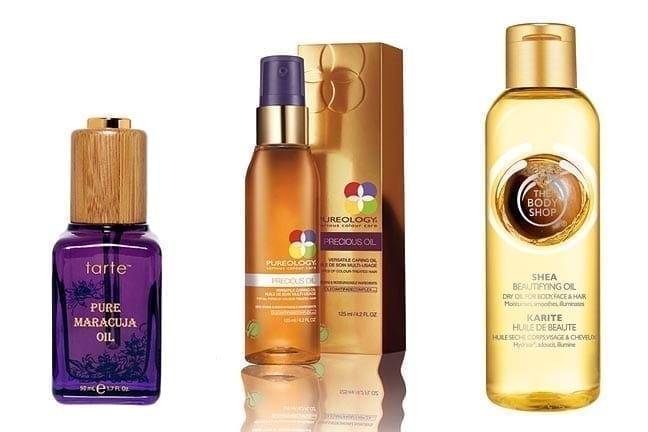You probably spent your early adult years leaving a trail of blotting papers and religiously buying “oil-free” products. But just as you now embrace “good” fats over fat-free foods, there may be a good case for considering oils in your beauty regimen.Not all oils are created equalMost notably, oils can be effective moisturizers. Plant oils, which have a presence in many beauty products, are primarily composed of glycerol and fatty acids. Each oil has a different number of carbons in its fatty acid structure, and the number affects how the oil gets absorbed by and stays on the skin or hair. For example, olive and jojoba oils work well on the skin because they have long chain molecules that stay close to the skin’s surface. According to Perry Romanowski, a cosmetic chemist in Chicago, longer chain molecules moisturize the skin better than shorter chain materials that get absorbed into the lower levels of the skin. For the hair, coconut oil offers the best of absorption and hydration; it’s primarily made up of 12-carbon fatty acids that penetrate the cuticle and give hair strength, too.MORE: Which Cooking Oil is Healthiest? Furthermore, oils offer side benefits, especially for the skin. “Many oils are rich in antioxidants, vitamins and essential fatty acids (EFAs), which can benefit all skin types,” says Jennifer Linder, M.D., assistant clinical professor of dermatology at University of California San Francisco. For example, kukui nut oil naturally contains vitamins A, C and E, powerful antioxidants that have anti-aging effects on the skin. In another example, rose hip seed oils contain EFAs that are necessary for healthy skin but must be supplemented because they’re not produced by the body.In effect, oils may not replace your heavy-duty winter balm or a face treatment, but they can play a crucial role in hydrating and delivering nutrients when you want something light but potent.However, note that just because an oil is billed as “natural” or “plant-based,” it doesn’t mean that it’s not pore-clogging. “Oils are greasy by nature regardless of origin,” explains Ni’Kita Wilson, YouBeauty Cosmetic Chemistry Expert. “Some natural oils can be lighter, like jojoba, palm or coconut oil, or very heavy, like wheat germ or castor oil.”How to use a multi-purpose oilSimilar to salves or balms, you can use oils anywhere you need moisturization. Unlike products that are only for the face or hands or feet, these oils don’t have boundaries—and they can even work on hair. Just make sure to follow the instructions and not use too much (a little goes a long way).Depending on your needs, you may want a product that is primarily for the face or body but can be used on the hair, or vice versa. According to Mona Gohara, M.D., assistant clinical professor of dermatology at Yale University, because the needs of the skin on the face are more specific than the body or hair, it’s best to start off a light product for those areas that need gentle hydration and see if you need something stronger for another part of your body or hair.MORE: Get Your Healthiest Hair With Three Natural OilsAre multi-purpose oils right for you?Multi-purpose oils are typically marketed for all types of skin or hair, but they may not be for everyone. If you have acne or eczema, consult your dermatologist before using them. “Oils may contain elements that are good for acneic skin, but I don’t think they have to be delivered through an oil. The whole goal of acne is to equilibriate oil production, so adding oils doesn’t make sense,” says Gohara.For those with sensitive skin, perform a test before you begin using a product, especially if the product contains essential oils, fragrances, or questionable ingredients, particularly if it’s made for the hair. “Many ingredients may translate for skin use, but a hair product will typically have other ingredients that would not be appropriate for daily use on the skin,” says Linder.How to strike oil:Some new multi-purpose oils promise hydration and benefits from head to toe.Mostly for the face, but may be used on body and hair: Tarte Maracuja Oil, $46, made from Amazonian passionfruit that is harvested once a year and extracted by hand, contains skin-friendly linoleic acid and brightening vitamin C.Mostly for the hair, but may be used on the face and body:Pureology Precious Oil, $40, contains a blend of four oils: sunflower oil, which provides omega-6 fatty acids; lightweight coconut and jojoba oils; and polyphenol-rich olive oil. The results are reduced frizz and added shine.For face, body, or hair:The Body Shop Shea Beautifying Oil, $14, nourishes the skin with nutrient-dense kukui nut oil and vitamin E-rich sweet almond oil.
© YouBeauty 2024




































